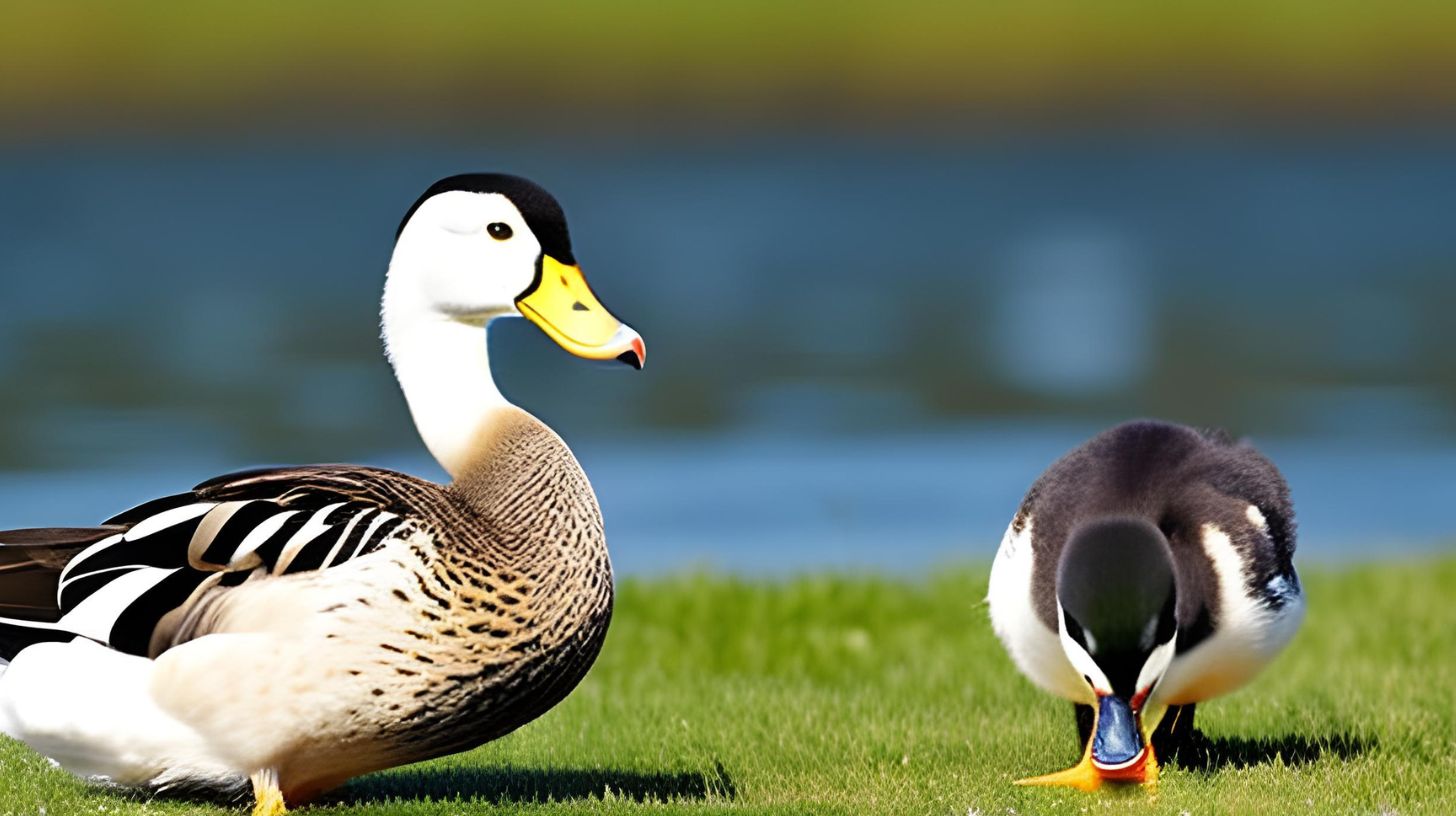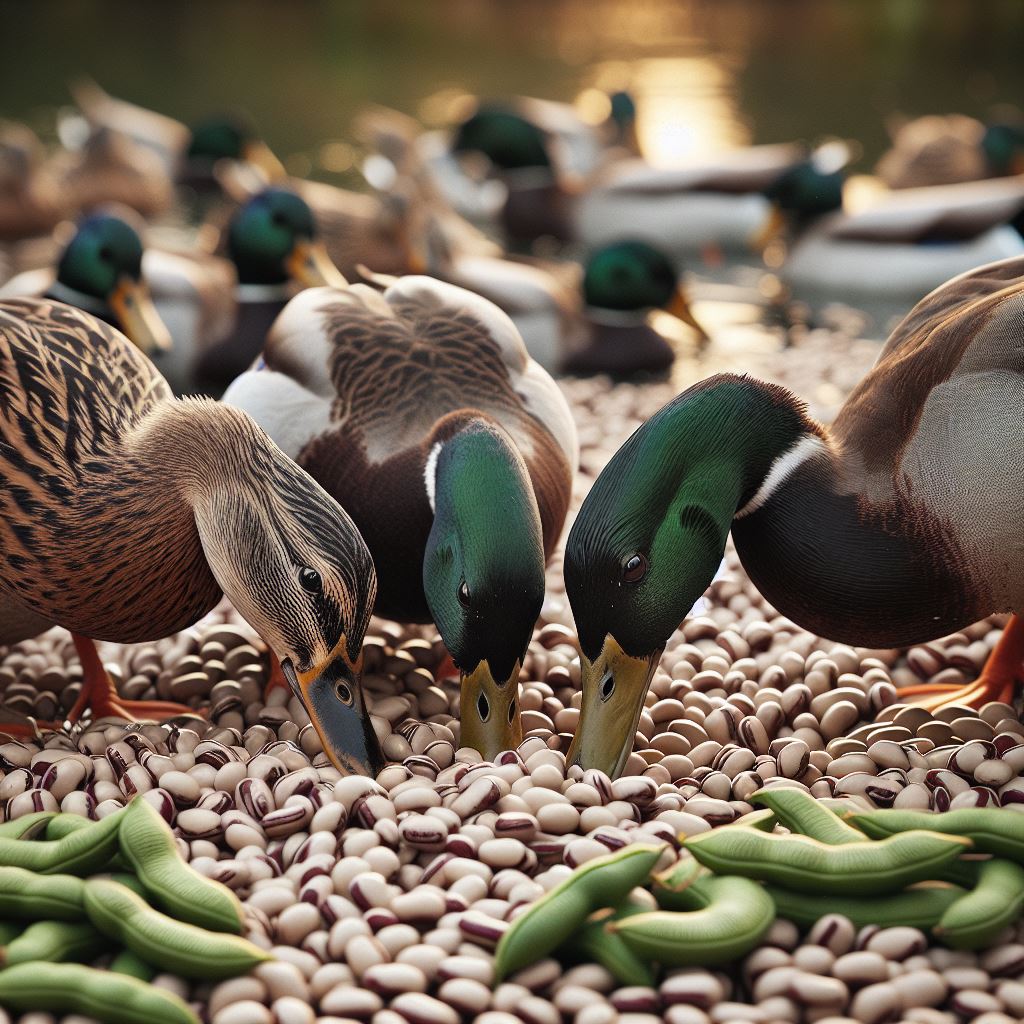Can Ducks Eat Bean Sprouts? Benefits And Risks
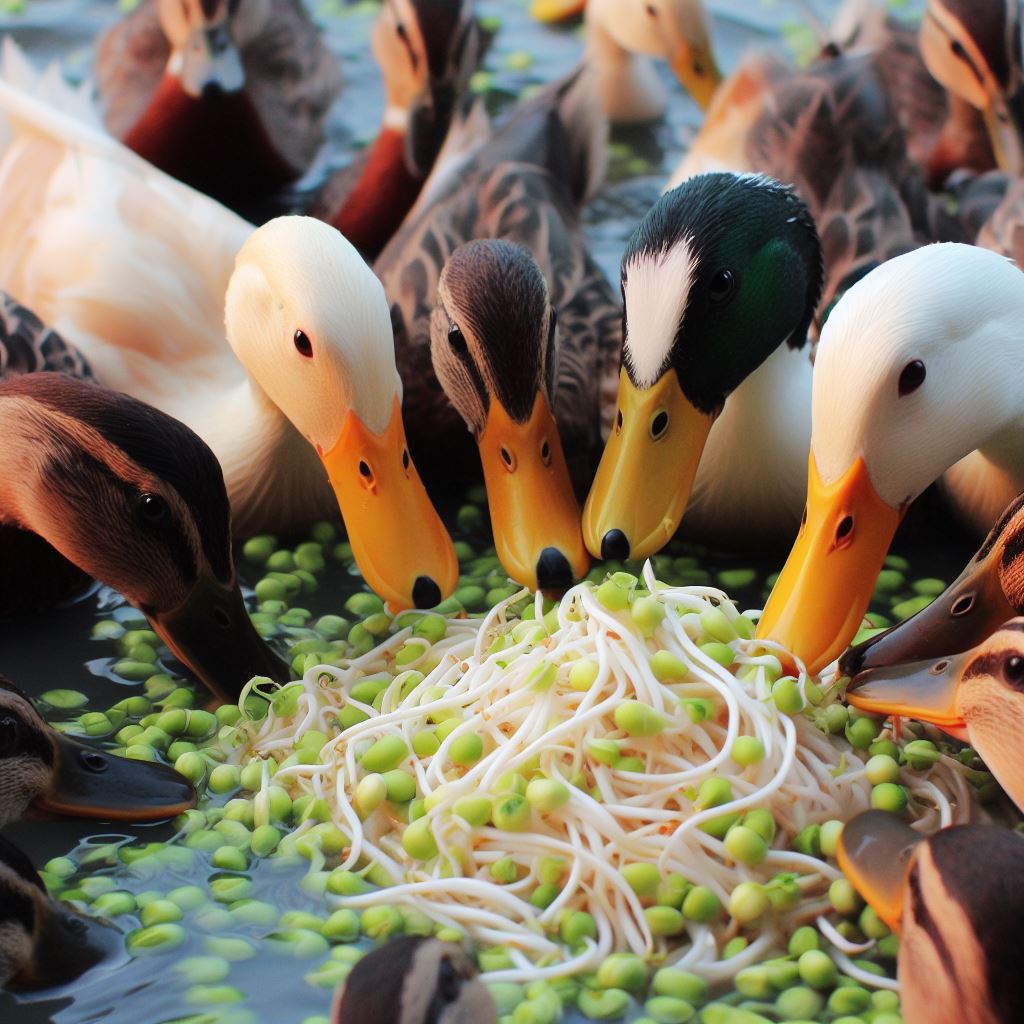
Table of content:
Can ducks eat bean sprouts? Bean sprouts can be a nutritious addition to a duck’s diet when fed in moderation. Here is a comprehensive guide on feeding bean sprouts and other healthy foods to ducks.
Key Takeaways:
- Bean sprouts contain useful nutrients but can cause digestive issues if overfed to ducks.
- Ideal duck diet consists of 70% commercial feed, 10-20% greens/veggies, 10% proteins, fruits, and seeds.
- Feed a variety of sprouts like alfalfa, mung bean, chickpea, and lentil in moderation.
- Chop sprouts into small pieces to prevent choking.
- Avoid feeding raw dry beans, onions, avocados, chocolate, salty foods.
- Provide grit to help ducks digest fibrous foods.
- Offer clean, fresh water at all times.
Sprouts have become a popular health food for humans in recent years, known for their crunchy texture and abundance of vitamins and minerals. But can ducks eat sprouted beans and seeds too? The short answer is yes, ducks can eat bean sprouts in moderation as part of a varied diet.
What are Bean Sprouts?
Bean sprouts are simply beans or seeds that have just begun to grow and germinate. The most common varieties are mung bean, soybean, alfalfa, lentil, chickpea, and wheatberry sprouts. They are low in calories and high in fiber, protein, vitamins C and K, folate, iron, potassium, and manganese.
However, sprouts also contain natural toxins to protect the plant in its vulnerable growing stage. This includes compounds called lectins and phytates that can irritate the digestive tract. For this reason, no more than 15% of a duck’s diet should comprise of raw sprouts.
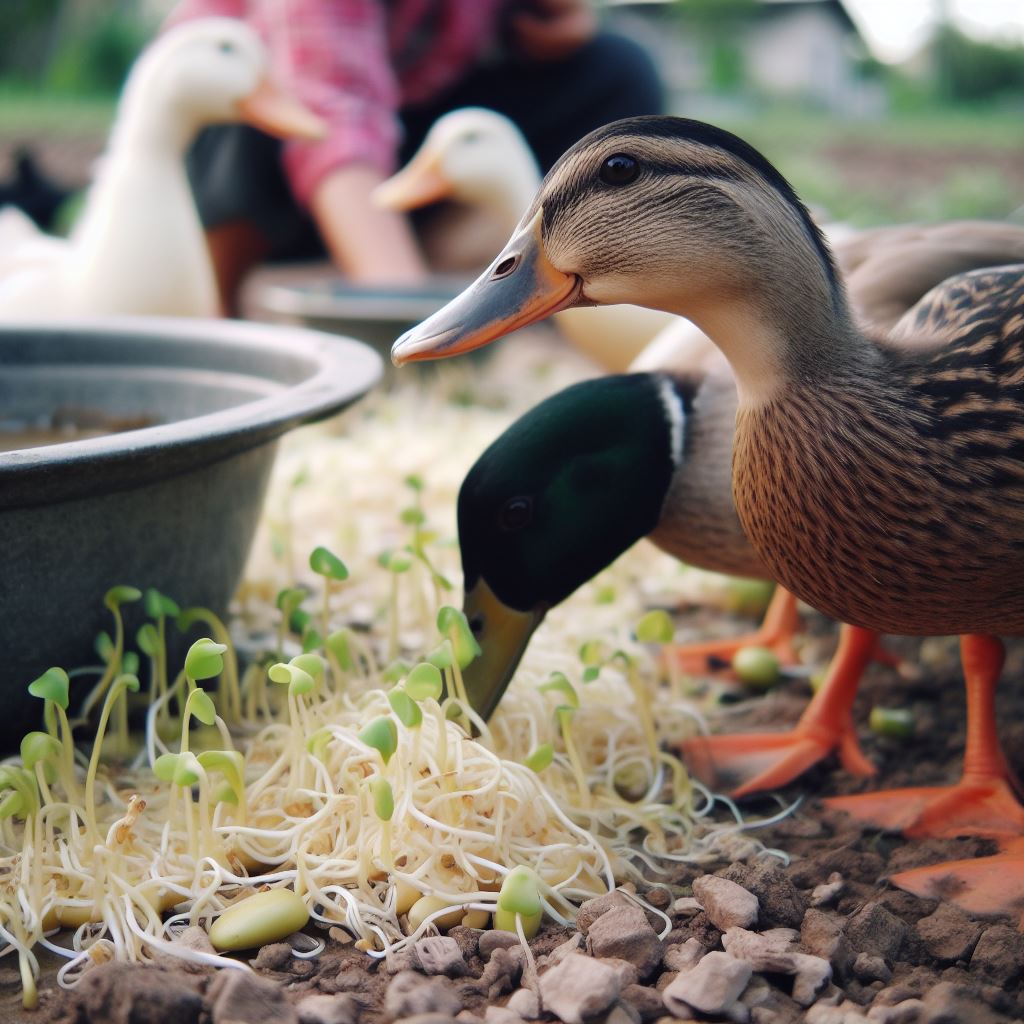 Benefits of Feeding Sprouts to Ducks
Benefits of Feeding Sprouts to Ducks
In moderation, bean sprouts can provide useful nutrition to ducks, including:
- Protein: Sprouts contain all essential amino acids needed for growth and maintenance.
- Fiber: Helps healthy digestion and nutrient absorption.
- Vitamins and minerals: Sprouts provide vitamin C, K, B vitamins, iron, calcium, and potassium.
- Variety: Sprouts add texture and variety to a duck’s diet.
Sprouts to Feed Ducks
The following sprouted seeds and legumes are duck-friendly:
- Alfalfa sprouts
- Mung bean sprouts
- Soybean sprouts
- Lentil sprouts
- Chickpea sprouts
- Wheatberry sprouts
- Pea sprouts
- Quinoa sprouts
Barley, oat, and other grain sprouts also make good choices.
Aim to feed 2-3 different sprouts each week for variety.
How to Prepare and Feed Sprouts
When feeding sprouts to ducks:
- Wash thoroughly to remove dirt and mold.
- Chop into small pieces so ducks don’t choke. Bean sprouts can be stringy.
- Mix in with other fresh greens and chopped fruits/veggies.
- Limit to 15% of total diet. Overfeeding can cause loose droppings.
- Provide insoluble grit to help ducks grind and digest plant fiber.
- Remove any uneaten sprouts within 1-2 hours to prevent spoilage.
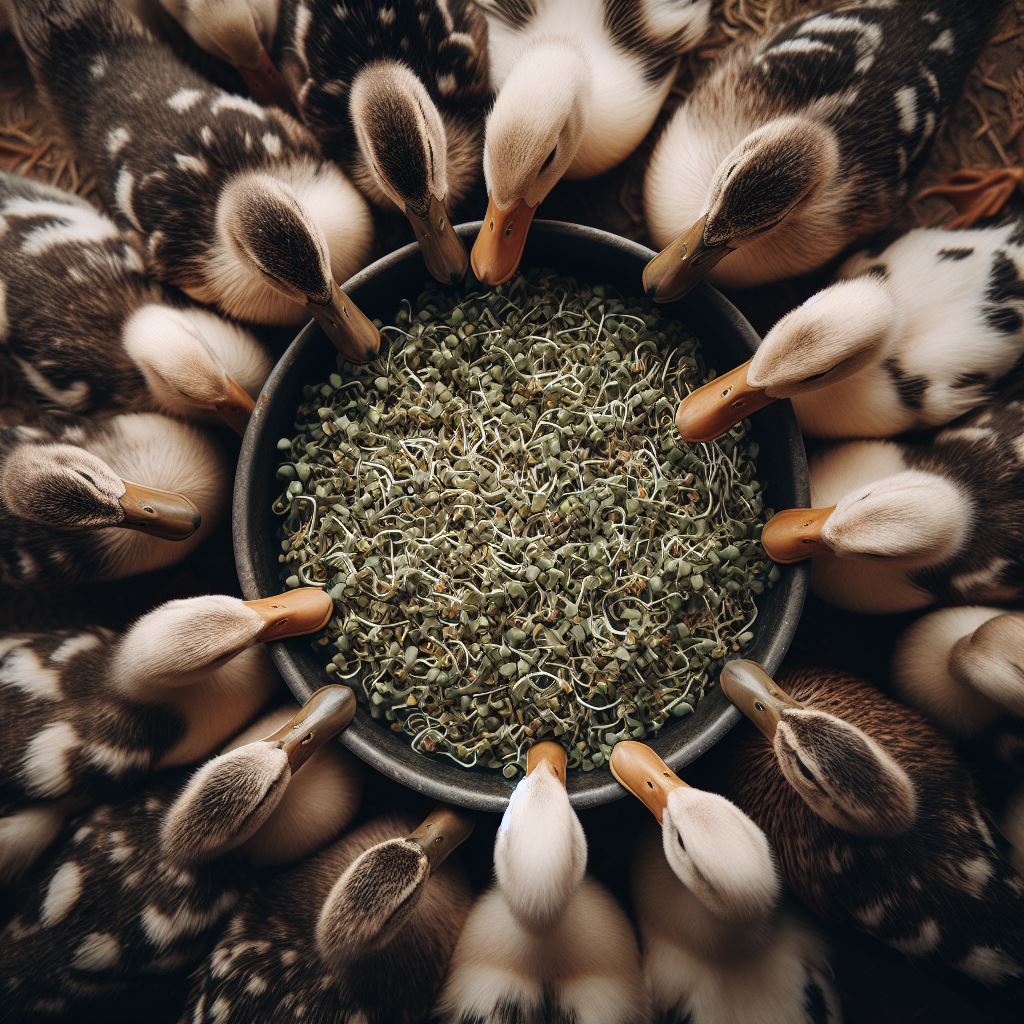 How Much to Feed Ducks
How Much to Feed Ducks
The ideal balanced diet for ducks comprises:
- 70% commercial duck feed
- 10-20% fresh greens – kale, lettuce, spinach, sprouts
- 5-10% fruits and veggies – corn, peas, chopped apples, berries
- 5-10% proteins – mealworms, crickets, greens, chopped hard boiled eggs
- Provide insoluble grit like granite grit, oystershell
- Fresh clean water always available
Adjust amounts based on duck’s age, activity level, and whether breeding, molting or brooding.
Foods to Avoid Feeding Ducks
Certain foods can be unhealthy, toxic, or even fatal to ducks:
- Raw dry beans or unsprouted legumes contain hemagglutinin lectins that can be toxic. Safe to feed thoroughly boiled or sprouted.
- Salty foods like chips, pretzels, and popcorn should be avoided.
- Chocolate contains theobromine, poisonous to birds.
- Caffeine and alcohol are unsafe.
- Avocados contain persin, toxic to waterfowl.
- Onions and garlic contain N-propyl disulfide which can damage red blood cells.
Signs of Improper Feeding
Monitor ducks for these signs of nutritional issues:
- Poor growth or body condition
- Lack of energy, lethargy
- Loose droppings from too much sprouts or greens
- Poor feathering
- Boredom or stress behaviors from lack of variety
- Difficulty swallowing or digestive issues
Adjust diet immediately to resolve any problems. Consult a vet for medical issues.
Difference Between Wild and Domestic Ducks
Both wild and domestic ducks have similar nutritional requirements. But there are some key differences in their natural diets:
| Wild Ducks | Domestic Ducks |
|---|---|
| Forage on aquatic plants, seeds, insects | Less foraging, more reliant on provided food |
| Protein from aquatic insects | Need insect protein supplemented |
| Wide variety of plants | Can be fed narrower diet if balanced |
| Eat grit while foraging to aid digestion | May need grit provided |
It’s important to mimic the diverse diet and grit wild ducks consume. This encourages natural feeding behaviors in domestic ducks.
Key Tips for Feeding Ducks
Follow these tips for raising healthy, happy ducks:
- Provide balanced commercial duck feed as dietary foundation.
- Offer chopped sprouts, fruits and greens for variety.
- Include protein sources like crickets, mealworms, eggs.
- Supply insoluble grit in a separate feeder.
- Allow grazing on grass, aquatic plants if possible.
- Give treats like sprouts in moderation.
- Avoid overfeeding grains/carbs which can cause obesity.
- Ensure plenty of fresh, clean drinking water.
- Clean feeders and change water regularly.
- Check for signs of malnutrition or illness. Adjust diet as needed.
- Consult an avian vet on any health concerns.
Conclusion
Ducks can eat bean sprouts and other seed sprouts in moderation as part of a nutritious diet. Around 15% sprouts is recommended, mixed with greens, vegetables, proteins and commercial duck feed. Avoid overfeeding sprouts or beans to prevent digestive upsets.
With a little planning, ducks can thrive on a diverse, well-balanced diet containing a variety of sprouts and other whole foods. Monitoring their health and adjusting the diet is key to raising healthy, happy ducks.
Welcome. I’m Adreena Shanum, the proud owner of this website, and I am incredibly passionate about animals, especially poultry. I founded adreenapets.com as a labor of love, stemming from my desire to share my knowledge and experiences with poultry enthusiasts worldwide.


